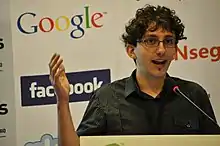Nadim Kobeissi
Nadim Kobeissi (Arabic: نديم قبيسي; born 28 September 1990) is a Lebanese computer science researcher specialized in applied cryptography. He is the author of Cryptocat, an open-source encrypted web chat client. Kobeissi is also known for speaking publicly against Internet censorship and Internet surveillance.[1]
Nadim Kobeissi | |
|---|---|
 Nadim Kobeissi in 2012 | |
| Born | September 28, 1990 |
| Citizenship | Lebanon |
| Education | Philosophy (BA) Computer science (PhD) |
| Alma mater | Concordia University École normale supérieure French Institute for Research in Computer Science and Automation |
| Known for | Cryptocat |
| Scientific career | |
| Fields | Computer science, Cryptography |
| Website | nadim |
Early life and education
Kobeissi was born in Beirut, Lebanon. He studied at the Lebanese American University in Beirut from 2008–2009, and graduated with a degree in philosophy at Concordia University in Montreal in 2013.
Kobeissi was a Ph.D. student in applied cryptography at the École normale supérieure in Paris and did his research within the French Institute for Research in Computer Science and Automation (Inria)[2] from 2015 to 2018.
Kobeissi is fluent in Arabic, French, and English.
Research
Kobeissi is the primary author of Cryptocat. The project was discontinued in 2019.[3]
In 2015, Kobeissi became active in researching formal verification for cryptographic protocols.[4] In December 2018, he defended his Ph.D. thesis, "Formal Verification for Real-World Cryptographic Protocols and Implementations. (Vérification formelle des protocoles et des implementations cryptographiques).".[5]
Activism
In 2010, Kobeissi was an early supporter of the Bradley Manning Support Network.[6] He organized a march through Montreal in December that year in support of WikiLeaks, ran a WikiLeaks mirror site, and defended WikiLeaks on various Canadian news publications.[7] During 2011 and 2012, Kobeissi hosted CHOMP.FM, a radio program on Internet activism that ran weekly on Montreal's CKUT-FM radio station. The show included guests from the Electronic Frontier Foundation (EFF), security researcher Bruce Schneier, and journalist Glenn Greenwald.[8]
In 2013, Kobeissi led an effort known as the Skype Open Letter[9] which brought together more than forty organizations, including the Electronic Frontier Foundation, Reporters Without Borders, and the Open Technology Institute, calling on Microsoft and Skype to release transparency reports regarding Skype monitoring and surveillance. The effort was successful, and Microsoft released its first transparency report shortly after the letter was published.[10]
References
- "How to fight PRISM". 21 June 2013.
- "Nadim Kobeissi". nadim.computer.
- "Crypto.cat".
- "dblp: Nadim Kobeissi".
- "Formal Verification for Real-World Cryptographic Protocols and Implementations".
- Nicks, Denver (2012). Private: Bradley Manning, WikiLeaks, and the Biggest Exposure of Official Secrets in American History. Chicago Review Press, p. 223.
- "Montreal student hosts mirror WikiLeaks site".
- For the march, see Shingler, Benjamin (18 December 2010). "Demonstrators march to support WikiLeaks in Montreal", The Canadian Press.
- For the mirror site, see "Montreal student hosts mirror WikiLeaks site". CBC News. 8 December 2012.
- Magder, Jason (11 February 2012). "Proposed changes to copyright law go too far, protesters say". Montréal Gazette.
- Pheenix. "PHEENIX::SELL". www.skypeopenletter.com.
- "It's Time for Transparency Reports to Become the New Normal". 29 January 2013.